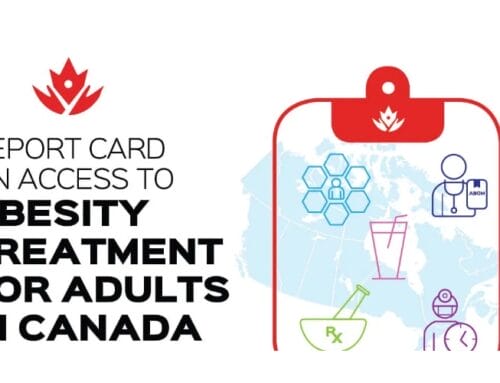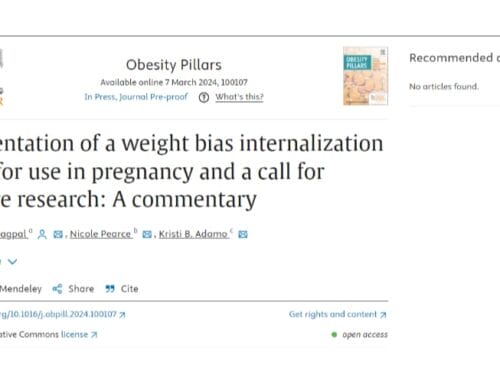Today’s blog post comes from Obesity Canada’s Director of Research and Policy, Dr. Ximena Ramos Salas.
On World Obesity Day (March 4, 2020) Obesity Canada will join international scientific and patient organizations in a joint declaration calling for the need to address the evidence-based root drivers of obesity.
Every government in the world has committed to international targets to address obesity – yet there has been zero progress to meet these goals.
In Canada we have demonstrated through our Report Card that access to care for people living with obesity is lacking.
The lack of access to obesity treatments is contributing to rising levels of severe obesity in Canada. Canadians struggle to find evidence-based case in their community and their disease continues to progress.
Unfortunately, as the prevalence of obesity continues to increase, so do levels of weight bias and stigma. There is now a pervasive narrative in our health care system that obesity is self-inflicted and caused mainly by unhealthy behaviours such as unhealthy eating and lack of physical activity. This belief is deeply ingrained in our society and represents a key barrier to access to obesity prevention and care for Canadians.
This is why Obesity Canada participated and contributed to an international call to action to end weight bias and obesity stigma.
In April 2018, a group of international experts (n=36) participated in a consensus development conference convened by Dr. Francesco Rubino, jointly with several partner organizations: American Association of Clinical Endocrinologists, American, Association for Metabolic and Bariatric Surgery, American Diabetes Association, Diabetes UK, European Association for the Study of Obesity, International Federation for the Surgery of Obesity and Metabolic Disorders, Obesity Action Coalition, Obesity Canada, The Obesity Society, and World Obesity Federation.
The consensus has now been published “Weight Bias and Stigma of Obesity: Causes, Consequences and a Call to Action – Joint Consensus Statement by International Scientific Organizations” and an international call to action to end weight bias and obesity stigma has been released.
The goals of the consensus statement are to:
- Inform healthcare professionals, policymakers and the public about the causes and harms of obesity stigma.
- Explain the gap between scientific evidence and the myths and misconceptions that reinforce weight bias.
- Propose a novel narrative about obesity, coherent with scientific evidence and respectful to the rights of afflicted individuals.
The scientific evidence is clear and unequivocal – weight bias and obesity stigma harm individuals living with obesity and contribute to global health and social inequities.
There is also an international scientific consensus that weight bias and obesity stigma are significant barriers for effective research, clinical practice and policies to prevent and manage obesity and that urgent action is needed.
The objectives of this international consensus statement are consistent with Obesity Canada’s goals, which have been ratified through three weight bias and discrimination conferences (2011, 2015, 2017) organized by the EveryBODY Matters Collaborative.
I was pleased to participate in this International Consensus Statement process and to be able to contribute a Canadian perspective to this global health challenge.
Obesity Canada continues to work to eliminate weight bias and obesity stigma. In the upcoming Canadian clinical practice guideline for obesity management in adults, Obesity Canada developed evidence-informed recommendations to eliminate weight bias and obesity stigma in health care settings. The guideline will be released later this year.
It is clear, however, that unless we change the narrative that obesity is a self-inflicted condition, health and social inequalities for people living with obesity will persist and even increase. This is simply unacceptable, in my personal and professional opinion.
This is why I have personally also signed the pledge to end weight bias and obesity stigma.
Photo credit: Change by chintermeyer / CC-by-SA-2.0






